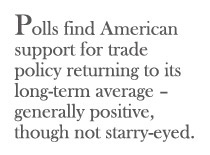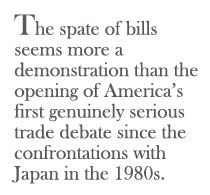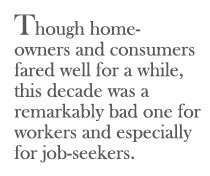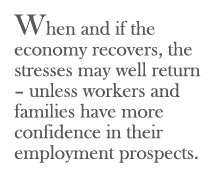The End of the Globalization Debate?
The End of the Globalization Debate?

WASHINGTON: Four months into its first term, the Obama administration seems the model of an internationalist, center-left government. It began its global-economy policy with a strong line against protectionism as a threat to recovery from this year’s economic crisis, an expansion of state aid to workers dislocated by trade competition, and a pledge of new money for the International Monetary Fund. From there it is moving on, looking for ways to encourage a new foundation for long-term growth based upon newly developing environmental technologies, moving a free trade agreement with Panama and then perhaps larger trade initiatives with Korea, Colombia and the WTO.
Meanwhile, American public opinion on trade has brightened. With the nation in a crisis emerging from the housing and financial services sectors, and with imports and trade deficits falling steadily and rapidly, polls find American support for trade policy returning to its long-term average – generally positive, though not starry-eyed – after a sharp dip in 2006 and 2007. And strong majorities, a 60-37 split in the most recent New York Times poll, believe the U.S. needs to cooperate with foreign governments on economics in order to solve the crisis.

Thus rather than a confrontation with China or a push to quickly reshape the North American Free Trade Agreement, the administration is emphasizing coordinated stimulus, open markets, and improved financial regulation. But the debate is more likely on ‘pause’ than settled for good. The last two weeks have brought a modest backlash against the administration’s internationalism.
Senator Sherrod Brown, a long-time critic of trade agreements from Ohio, introduced a bill to prevent negotiation of any new agreements, pending a revision of all the old ones: “if in fact President Obama does not open up NAFTA for review, we must not continue the failed system for future trade agreements.”
A group of quasi-‘populist’ House Democrats, calling themselves the Trade Working Group, is resolutely attacking the agreement with Panama. The group’s leader, a Maine Representative, terms the agreement “Bush-era” (despite its revision to include the labor-and-environmental clauses long sought by unions and environmentalists) and calling the president’s plan to move ahead with it “absolutely outrageous and a serious mistake.”

And an industry/labor group called the Fair Currency Coalition, centered on steel and textile interests, announced a new bill to force the administration to threaten China with tariffs to gain a change in currency values, recruiting Michigan Senator Debbie Stabenow and Kentucky economic-nationalist Republican Jim Bunning, plus forty House members from both parties to introduce it.
The spate of bills seems more a demonstration than the opening of America’s first genuinely serious trade debate since the confrontations with Japan in the 1980s. In 2009, as the administration struggles with the financial crisis and the public hopes for cooperative relationships with foreign countries, these bills aren’t likely to be enacted, and they seem unlikely to succeed in blocking the Panama agreement. But these rumblings amount to the first challenge to Obama’s ability to set policy for Democrats – and highlight the importance less of the administration’s early trade strategy than of its long-term hopes for re-founding American growth and employment in new “green” industries.
The rebound in public support for trade this year comes after a sharp drop between 2004 and 2007. This in turn coincided with a period of growth – but growth that seemed to reach few workers. Household wealth grew rapidly, as low interest rates pushed up stock market accounts, home values and GDP. But though home-owners and consumers fared well for a while – in retrospect, too well for their own good – the decade was a remarkably bad one for workers and especially for job-seekers.

The millennium’s first decade featured the slowest growth in employment since the anomalous 1930s. Since 2000, the US has added a net gain of 1.7 million jobs – after a gain of 17 million in the 1960s, 19 million in the 1970s, another 19 million in the 1980s, and 21 million in the 1990s. Factory work fared especially badly. It has been declining almost everywhere in the world, and has been falling as a share of the U.S. workforce since the mid-1950s. But this decade’s experience was not a decline but a sheer drop, from 17 million factory jobs in 2000 to 12 million this year – the lowest total since the 1940s.
In these circumstances, unhappiness is natural and will find a target. The most plausible cause of the phenomenon is the massive rationalization of industry through the Internet and information technology. But technology is a hopeless villain, as attempts to reverse it are usually futile and most people like it anyway. Instead, this decade’s years of growth saw a surge in unhappiness with immigration among Republicans and with trade competition among Democrats. Last year’s presidential primaries provided a highlight, with the intense competition among Republicans to sound tough on immigration and the debate among Democrats over the North American Free Trade Agreement.
In fact, attempts to solve the jobs problem by addressing these issues haven’t worked especially well. The Bush administration’s experiment with steel tariffs in 2002 and 2003 achieved little. Its imposition of quotas on Chinese textiles between 2006 and 2008 had no effect at all. Neither has the fence built along parts of the US-Mexico border done much. But though such policies may offer little promise, they reflect a genuine alarm that will naturally be reflected in the political system.

For now these emotions have faded, muted by the larger threat of the financial crisis, and confined to the traditionally trade-skeptical politicians filing the bills. To the broader public, the risks of confrontational trade policy apparently seem much higher than they did a year ago, and support for more cooperative relationships with foreign governments is unusually high. And in any case, the rising trade-deficit figures and illegal-immigrant counts have gone into reverse this year. This year’s trade imbalance, in fact, has already dropped to levels last seen in the late 1990s, as shoppers stay out of malls and auto dealerships. In total, it may fall from $700 billion in 2008 to $300 billion in 2009.
But when and if the economy recovers, the stresses may well return – unless workers and families have more confidence in their employment prospects. In this case, the globalization debate could pick up where it left off last summer, in the weeks before the crisis began.
This is why, as heartening as the administration’s early trade and global-economy policies are to internationalists, the real promise may lie in the administration’s hope for a new domestic foundation for economic growth and employment. If that works out as Obama hopes – with investors channeling their money less often into real estate and finance, and more often into research, environmental innovation and clean investment – we may see companies hiring people again. If so, the trade and immigration anxieties of the pre-crisis years may fade permanently. If not, they will be with us again.